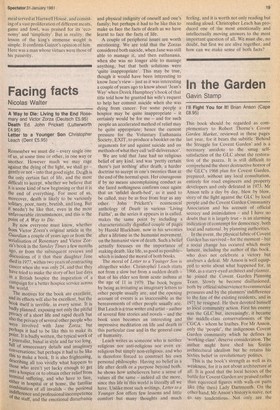Facing facts
Nicolas Walter
A Way to Die: Living to the End Rosemary and Victor Zorza (Deutsch £5.95) Death Ed. John Prickett (Lutterworth £4.95) Letter to a Younger Son Christopher Leach (Dent £5.95) Remember we must die every single one of us, at some time or other, in one way or another. However much we may rage against the dying of the light, we shall go gently or not into that good night. Delth is the only certain fact of life, and the most difficult to accept, whether we believe that it is some kind of new beginning or that it is the end of everything. For most of us, moreover, death is likely to be variously solitary, poor, nasty, brutish, and long. But It needn't be like that, even in the most unfavourable circumstances, and this is the Point of A Way to Die.
By now everyone must know, whether from Victor Zorza's original article in the Guardian a couple of years ago or from the serialisation of Rosemary and Victor Zorza's book in the Sunday Times a few months ago, or from the subsequent reviews and discussions of it that their daughter Jane died in 1977, within two years of contracting cancer when she was only 24. and that they have tried to make the story of her last days iI1 a British hospice the inspiration of a campaign for a better hospice service across the world.
The motives for the book are excellent, and its effects will also be excellent, but the book itself is terrible, in every sense. It is badly planned, exposing not only the pitiful Privacy of a short life and rapid death but also the privacy of several other people who were involved with Jane Zorza; but Perhaps it had to be like this to make its Point. It is badly,written, the typical work of a journalist, banal in style and far too long, 11111 of unnecessary details and imaginary conversations; but perhaps it had to be like to make a book. It is also frightening, uescribing all too vividly what happens to !hose who aren't yet lucky enough to get into a hospice or to obtain other relief from terminal suffering, and who have to face, either in hospital or at home, the familiar Fombination of all invalids the personal indifference and professional incompetence of the staff, and the emotional disturbance and physical indignity of oneself and one's family; but perhaps it had to be like this to make us face the facts of death as we have learnt to face the facts of life.
A couple of peripheral issues are worth mentioning. We are told that the Zorzas considered both suicide, when Jane was still able to manage it, and then euthanasia, when she was no longer able to manage anything, but that both solutions were 'quite inappropriate'. This may be true, though it would have been interesting to know Jane's view just as it was interesting a couple of years ago to know about 'Jean's Way' when Derek Humphrey's book of that title told how he granted his wife's request to help her commit , suicide when she was dying from cancer. For some people a hospice may be quite inappropriate it certainly would be for me and for such people an accelerated method of relief may be quite appropriate; hence the current pressure for the Voluntary Euthanasia Society, EXIT, to produce a booklet on the arguments for and against suicide and on methods of what they call 'self-deliverance'.
We are told that Jane had no religious belief of any kind, and was 'pretty certain there's just nothing' after death, a harder doctrine to accept in one's twenties than at the end of the normal span. Her courageous if by no means uncomplaining conduct as she faced nothingness confirms once again that an `infidel death-bed', as it used to be called, may be as free from fear as any other. John Prickett's ecumenical anthology of Death in various 'Living Faiths', as the series it appears in is called, makes the same point by including a characteristically dignified couple of pages by Harold alackham, now in his seventies after a lifetime in the humanist movement, on the humanist view of death. Such a belief , actually focusses on the importance of making death, like life, as good as possiblewhich is indeed the moral of both books.
The moral of Letter to a Younger Son is altogether wider. Christophir Leach starts not from a slow but from a sudden death that of his elder son from acute asthma at the age of 11 in 1979. The book, begins by being as irritating as imaginary letters to other people usually are, and the opening account of events is as inaccessible as the bereavements of other people usually are. But Leach is a true writer and artist author of several fine stories and novels and the book soon becomes an interesting and impressive meditation on life and death in this particular case and in the general case of humanity.
Leach writes as someone who is neither religious nor anti-religious nor even exreligious but simply non-religious, and who is therefore forced to construct his own personal philosophy. Having no belief in a life after death or a purpose beyond both, he shows how unbelievers have a sense of values all the same indeed all the more, since this life itf this world is literally all we have. Unlike most such writings, Letter to a Younger Son offers few lessons and little comfort but many thoughts and much feeling, and it is worth not only reading but reading aloud. Christopher Leach has produced one of the most emotionally and intellectually moving answers to the most important question of all. We must die, no doubt, but first we are alive together, and how can we make sense of both facts?






































 Previous page
Previous page